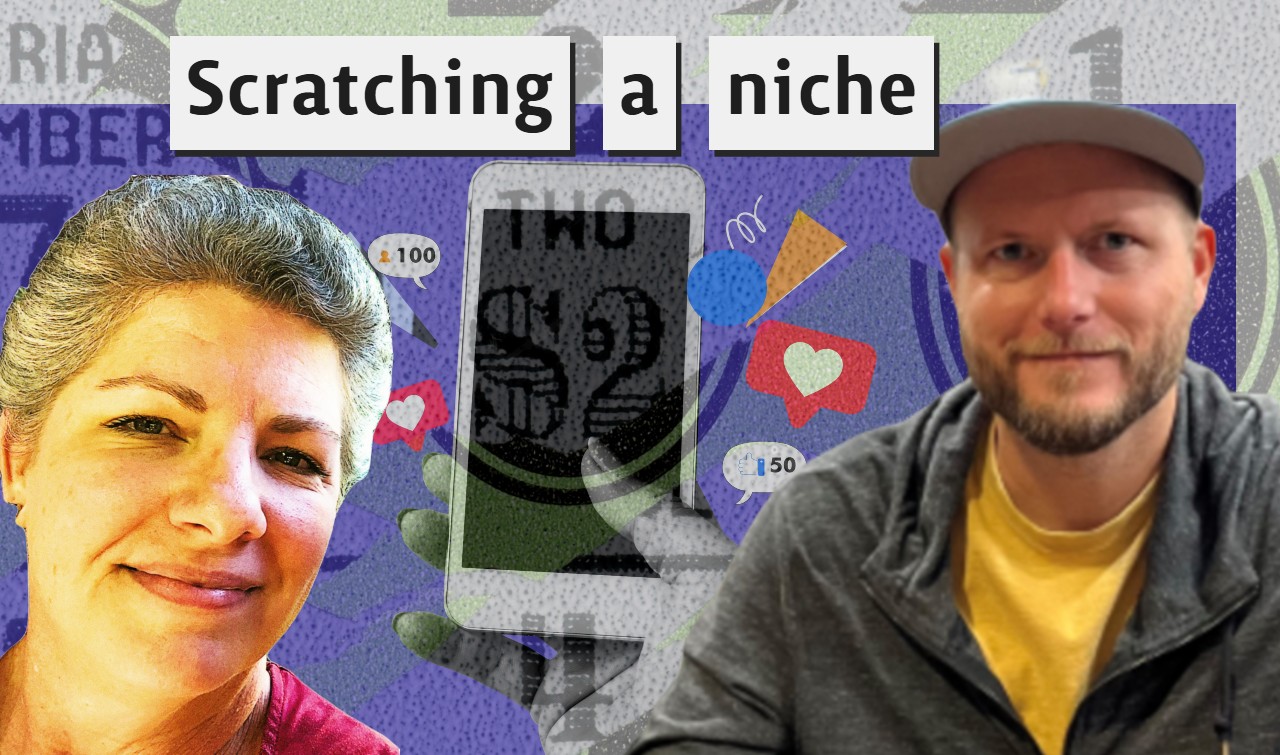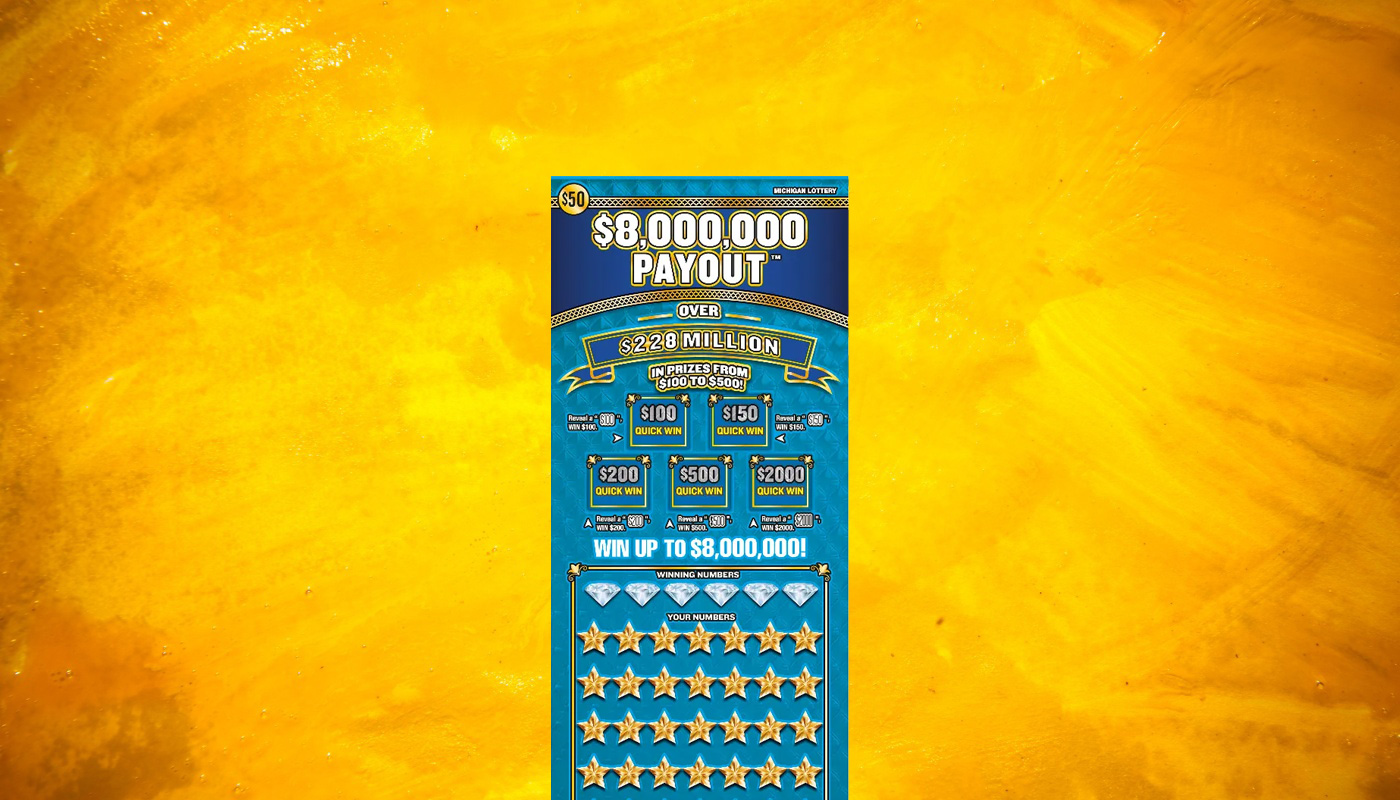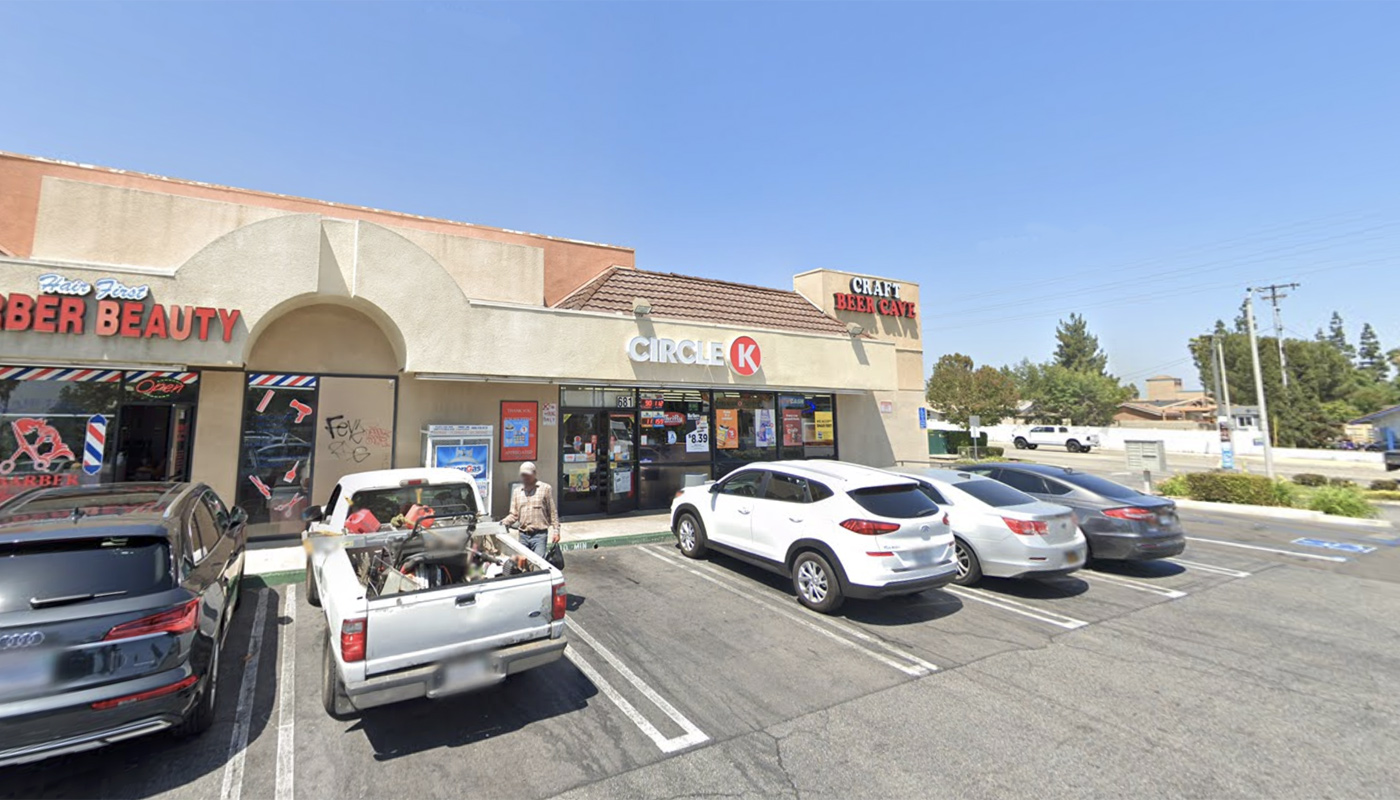
News writer; Opinion columnist
"Scratch off" in a YouTube search bar is the password for the rabbit hole.
One click reveals screen after screen of scratch-ticket content creators generating mounds of metallic flakes in the livestreams and videos they post each week. Their thousands - sometimes millions - of viewers watch, rapt, commenting frantically, living vicariously.
Sometimes, there are wins. Mostly, there are losses. The disembodied set of hands and the narration tell the tale. Occasionally, there's another run to the store for a hot new ticket or a search for a long, lost, unclaimed winner.
There's a personality and an accent for almost everyone. Young, old, male, female, cheerleader, realist.
The cheerleaders have theories about perforations and white lines on tickets and the mega supermarket selling all those winners.
The realists assure their faithful that they should take each extra couple of bucks as a lucky break. And have a budget they don't break.
It's about right time, right place, they preach.
For two of the more popular creators in this niche realm, viral fame was very much the same.
Right place. Right time.
And quite often, that right place is Florida, an epicenter of lottery fervor that helped launch personalities Tanya Fischer, known as Grandma Scratcher to her nearly 100,000 subscribers, and fellow Floridian Ondrei Ronhaar, whose Get Rich or Die Scratching channel boasts 149,000.
While tourists flock to Florida for sunburn and sand, online lottery enthusiasts clamber for creators like Fischer and Ronhaar as they harvest the state's wide array of tickets and hefty pots.
Fischer, 54, (pictured above, left) launched her channel two years ago with “no goal in mind” and laughs over whether her grown children are even among her subscribers. Each social media platform has different rules and tolerances for what kind of gambling verbiage is allowed, but Fischer has found a throughline to connect with a large audience.
The Central Floridian recalled for Lottery USA:
I remember reading a theory about lipstick. It was: even in times of recession and the Great Depression, people still found a way to buy low-cost items because they considered them a luxury. I remember when I started the channel, I was thinking that, for me, lottery tickets kind of fell into that [category] because you don't have to buy ten. You can buy one $1 ticket, and you've got a shot at winning $5,000. Where else are you going to get that? I thought, well, other people are doing it. I can do it, too. And maybe people will enjoy it.
Ronhaar, a 41-year-old energy trader from Clearwater, Fla., also began his career online with meager expectations. He knew he wanted to “do YouTube” but didn't have a subject until a co-worker suggested what eventually led to Get Rich or Die Scratching.
Ronhaar (above, right) told Lottery USA:
I had no clue if anyone even watches this stuff. So we looked it up, and there are videos on YouTube with millions of views. And I was like, 'Oh s—, people watch that. OK.'
They were just scratching the surface.
Grandma Scratcher joins the league of YouTube legends
Fischer's late mother “loved a good scratch-off ticket,” she said, but the debut of the Florida Lottery the year Fischer turned 18 was more influential in sparking her modest gambling career.
“I've always been a big dreamer with the lottery,” she admitted. “I just love doing the lottery.”
Around her Mega Millions and Powerball dalliances, she'd occasionally grab a scratch-off and eventually notice how chocked YouTube was with videos of players rubbing coins on tickets or scanning their barcodes for winners. The views astounded her.
Fischer, an Amazon associate, brought no video skills to the endeavor. Her production studio consists of a canister balancing an iPad for the crucial overhead shots. While some creators are more flamboyant with their scratchcraft - Texas-based Fixin' to Scratch brandishes a branded coin for his 155,000 subscribers - Fischer uses a cuticle tool.
The first post, she laughs, was “absolutely terrible.”
But they got better. As she scratched away on her mother's hand-painted table, the audience slowly expanded, drawn in by Fischer's folksy banter and because some were sentimental about mothers or grandmothers who once loved a good scratch-off ticket, too. After just two months, Grandma Scratcher was monetized.
“It just kind of took on a life of its own, and never, ever would I have thought that two years into the channel, we'd be nearing 100,000,” she admitted. “That's absolutely crazy to me.”
Awakening as a viral sensation one morning last year helped. In the maddening yet fascinating algorithm of online fame, Grandma Scratcher was launched by a League of Legends YouTuber who was amused by one of her videos heavily referencing the number “4.” Fischer later learned that the crucial digit is the obsession of game character Jhin.
The video exploded. It currently boasts 1.7 million views.
Fischer admitted:
It wasn't anything I was doing. It was just by chance, a goofy ticket that struck a nerve with a bunch of people, not necessarily even lottery people, just people in general who thought it was funny. It was literally one of those things where I went to bed one night and woke up the next day and thought, 'That's a really large number on my YouTube account.'
Ronhaar has become similarly amused by the vagaries of his viewership. One trend has become clear, though: all five of his videos with more than a million views feature him playing full packs of tickets.
He marveled:
Specifically on YouTube, the full-pack videos seem to just do really, really well. It's literally so wild to me because I'll have, for instance, my 5k winner, a huge win, and sure, it gets good views, but it's not getting two million views.
Monetizing, expanding, and gambling responsibly
Amassing 100,000 subscribers earns YouTubers a Silver Play Button and a boosted ego. And the pressure to maintain the pace with zero additional ad revenue than what they already glean from views. Fischer, who details her net outlay in her YouTube description, said her ad revenue some months offsets her ticket purchases. Ronhaar, too, said after five years of posting, YouTube revenue helps him “free-roll” his lottery play.
There were also little lessons to be learned so as not to cost themselves money. Ronhaar had to edit out a video about purchasing tickets at a Publix supermarket recently because a song playing in the background would have likely earned a copyright infringement.
The lottery has not made Fischer rich despite her volume of play.
Her biggest scratch-off win predates Grandma Scratcher - $1,000 - but she's hit for $500 twice since becoming a YouTuber.
Her biggest lottery payout was on the Florida Lotto in 2020, hitting five of six numbers for $11,000. One more correct number, she laments, would have yielded $9 million.
And despite living in rules-fluid Florida, COVID-19 lockdowns at the time denied her a staged picture with a big fake check. She got payment in the mail after depositing the winning ticket in a drop box at a district lottery office.
A healthy dose of reality keeps Ronhaar grounded
There's an irony to the name of Ronhaar's channel because he absolutely doesn't believe that scratch-offs are a path to future wealth, and it stands to reason from his videos that he doesn't want his viewers shouldn't perish in the endeavor.
A competitive poker player, he finds a clear delineation between his chosen modes of gambling.
He said of scratch-offs:
It's just pure luck. Some people say luck isn't a thing. But it's just 100% random. I've played so many tickets. I've bought books. It's just being in the right place at the right time in that magical moment, like when somehow you happen to hit that one ticket out of millions and millions and millions and millions of tickets they're printing.
Ronhaar spends what he's willing to lose each week - $300 - and deems his biggest win - $5,000 - happenstance after buying a book of scratchers from a Chevron station in February of 2023.
He explained:
I bought a pack of the $5 'Lucky Numbers.' It was actually a 50-50 split. I split it with this girl. We each went in for $150. We bought this $300 pack. We're just going through the pack; it seems to be a regular pack, and we're about to lose half our money. It's pretty usual, but nothing exciting. Then, on ticket 53, I got a five-time multiplier symbol. And when I revealed the prize of $1,000, I about s— my pants. I'd never won anything like that before.
While his videos - including the “Lucky Numbers!” live stream of the $5,000 hit - convey this kind of excitement for his viewers, Ronhaar admits to a “borderline apathy” in dealing with superstitions or the professed strategies of some players.
“I want to win. Trust me, that's my goal,” he said. “ [But] once you start running the numbers and you go, 'OK, wait, what are the odds that I could actually win something?' when you actually do the odds, it's horrific.”
So what makes it interesting?
“I would like to win. So that keeps it interesting,” he asserted, “the joy of hitting big when you do. Once in a while, you do hit a $500 winner, a $1,000 winner. You might hit the $5,000 winner once. It's still fun to play them.”
Ronhaar began posting in March of 2019 and boasts one of the top subscriber bases of the genre. Initially, he was fixated on analytics and “super systematic about it,” he said, buying $300 in tickets on Friday and recording two or three videos to post throughout the week. On Tuesdays, he'd livestream and open a ticket book he'd bought into with a group of friends and acquaintances. Now, he said, he's lost the “rigidness” of the schedule - posting something at least every three or four days - as his video count expands beyond 1,500. He said:
Some channels post daily. Some channels only post wins. I post losses because I don't want to mislead the audience. I don't want the audience to think like, 'Oh, this guy's got a horseshoe stuck up his ass,' and then he loses. People lose, and they lose a lot. And even if they write that in their descriptions, who takes the time to read your description? Very few people.
Fischer, too, does not edit videos to highlight wins.
Maintaining pace and audience while enjoying the ride
Fischer is active on YouTube, TikTok, and Facebook and she feels guilty when she doesn't post something every day. She generally succeeds with at least a short-form post, committed to the highly active segment of her base that remains in regular communication in the comments section. She said:
If I was in public picking up tickets and somebody walked up to me and said, 'Hey, I'm … so-and-so,' I would probably know exactly who they were. I have subscribers that literally message me every single day on the channel. I have some subscribers that message me through my email, and I know things about them and personal life, and they just need someone to talk to.
And communities can have divergent opinions, including whether Fischer should spend her money gambling. She continued:
I'm like, you don't really know my situation. You want it to stay fun, and there are definitely days where I look at my husband, and I go, 'Oh, I gotta go pick up scratch-off tickets,' and I forget, which is why it's so funny when people make comments like 'You have a gambling addiction.'
Fischer begins every livestream or upload with her own responsible gambling message before opining about a country song that's stuck in her head or reviewing a new fingernail polish before foisting her cuticle tool for the merriment of the day. She stated:
A big part of my channel, my persona, and my whole thing, and in real life, is you don't play what you're not willing to lose. It's gambling. No matter how fun it is, no matter how cute it is, it's gambling. It is an addiction for some people. I have some subscribers who've reached out and said, 'Listen, I just want to let you know I have a gambling problem. And the reason I don't gamble is because I just watch your channel instead.' They live vicariously through whatever I'm doing on the channel.
Ronhaar's message, too, is one of realism and responsibility.
“You have to play within your means; otherwise, the sorrow sets in because you overextend yourself,” he said. “The guilt, you know? You're gambling. I just happen to be very, very budgeted and controlled on my spending.”
Ronhaar, who, like Fischer, has revealed his face on his channel, characterized his interactions with viewers as “very supportive, generally speaking.” He seems unfazed by the other side of viral acclaim.
“When a video is 'going viral' you start getting hate comments, insults,” he laughed. “I don't care what you want to say. Thanks for the view.”
Fischer's approach to gambling extends to her only other gaming indulgence: casino cruises. Even then, she and her husband put themselves on a $40 daily budget.
“The first day, we don't do anything. And the second day, the third day, we just do slot machines,” she said. “We put 20 bucks in, and the last time I put 20 bucks in, on the first pull, it came up $63. I cash out. My husband goes over and puts $20 in his first one. It comes up he's won $80. Cash out. We left within five minutes.”
Ronhaar's scratch-off impact may transcend YouTube
While he still enjoys his channel, Ronhaar has already begun devising his next evolution in the niche: an app to track spending and return for scratch-offs that will also deliver the cost to win certain jackpots. He explained:
So, for instance, your odds to win a million might be 1 in 1.8 million tickets. But if the cost of the ticket is $20 instead of $5, your cost to win is exponentially higher. It's four times higher. So if you want to know what ticket gives you the mathematical best odds to win, they're still terrible odds, but if I'm going to play a terrible-odds game, let me play the one with the best odds.
And when he does, plenty will be watching.


















Comments